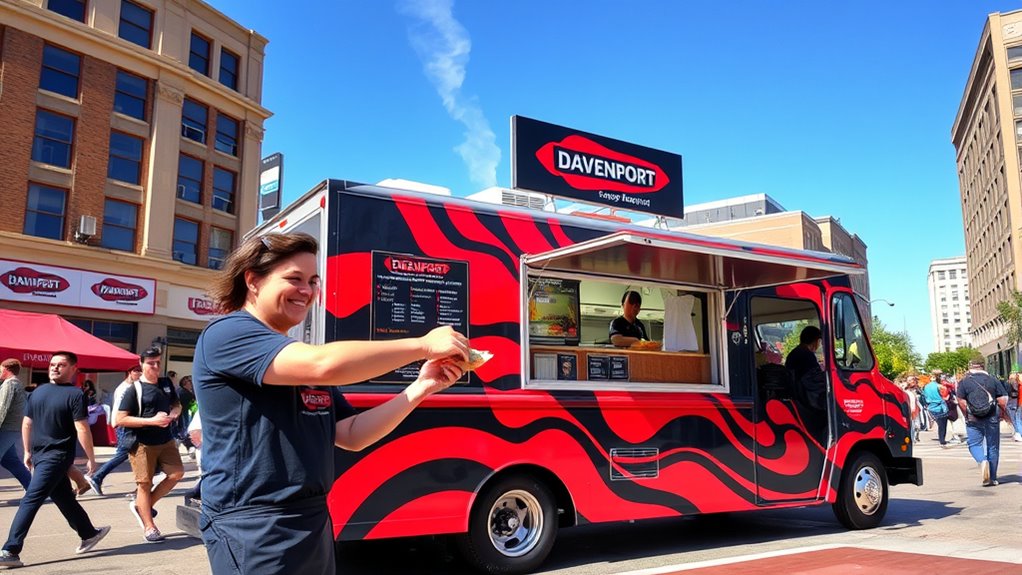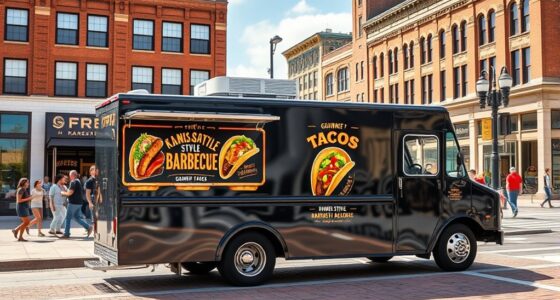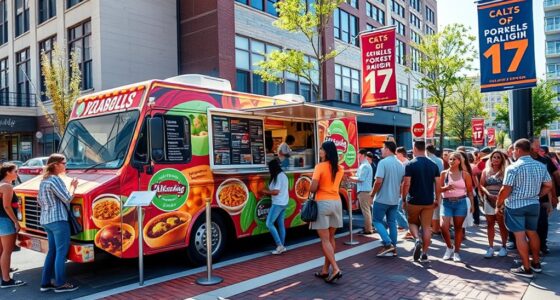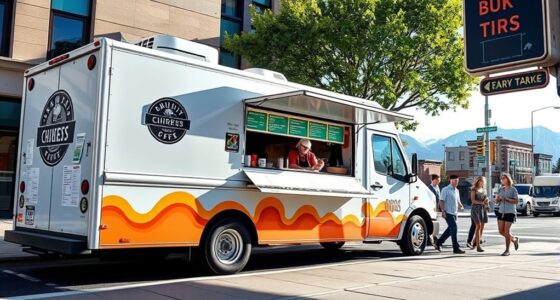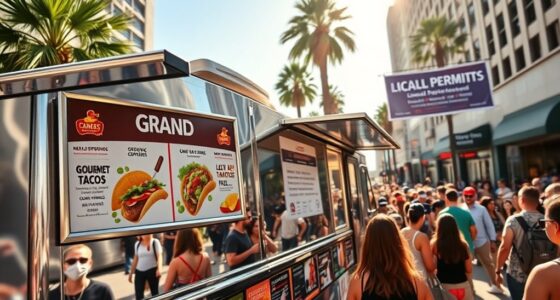To open a food truck in Davenport, Iowa, you’ll need to obtain permits from the Scott County Health Department and Davenport city, costing around $27 and $55 annually. Find approved locations that comply with zoning and parking laws, and plan for menu approval and food safety certification. Budget for truck, permits, supplies, and marketing. If you keep exploring, you’ll discover how to successfully manage your food truck and attract customers.
Key Takeaways
- Obtain Iowa State and Davenport-specific mobile vendor licenses, costing around $27-$55 annually, with required food safety training and health inspections.
- Secure permits for street vending starting at $100, with location approval, and adhere to regulations on operating days and site restrictions.
- Choose compliant locations that meet zoning, parking, and pedestrian laws, and coordinate with property owners for approval.
- Submit detailed menus with equipment and safety plans, employ a Certified Food Protection Manager, and follow food safety and sanitation standards.
- Promote your food truck via social media, participate in local events, and develop appealing menus targeting Millennials and Gen Z customers.
Navigating Permits and Licensing in Davenport

Are you planning to start a food truck in Davenport? First, you’ll need to secure both state and local licenses. The Iowa State Mobile Vendor License is issued by the Scott County Health Department after you submit an application, pass a food safety course, and clear a health inspection. It costs around $27 annually. In addition, Davenport requires a city-specific license costing $55 per year, which demands proof of insurance, a fire inspection, and the county health permit. You must also comply with zoning, parking, and pedestrian laws. Your license must be displayed on your vehicle during operation. Be prepared to submit detailed plans and documentation, including a menu and equipment list, and ensure at least one employee holds a Certified Food Protection Manager certificate. Local regulations vary, so staying informed about city ordinances is essential for smooth operation. Additionally, keeping up with permit renewal deadlines will help prevent any interruptions in your business activities.
Understanding the Costs of Operating a Food Truck
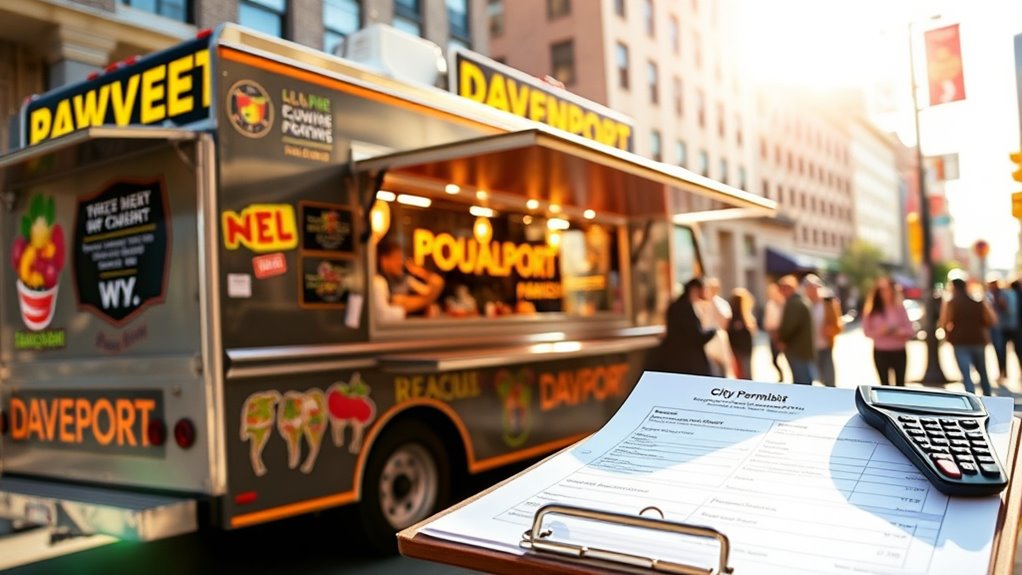
Understanding the costs of operating a food truck involves more than just the initial purchase price. You’ll need to budget for licensing, permits, and ongoing expenses like maintenance, insurance, and supplies. Being aware of these costs helps you plan effectively and keep your business financially healthy. Proper planning ensures you can handle unexpected expenses and avoid cash flow issues as your business grows. Additionally, considering fire safety regulations is important to prevent costly violations and ensure safe operation.
Licensing and Permit Fees
Operating a food truck in Davenport, Iowa, involves several licensing and permit fees that you need to budget for upfront. First, you’ll need a State Mobile Vendor License, costing $27 annually, which requires application, inspection, and food safety training approved by Scott County Health Department. You’ll also need a Davenport Business and Mobile Food License, costing $55 annually, with approval from multiple city departments and proper license display. For special events, temporary licenses are required—$50 per event or $200 for seasonal multi-event permits. Late payments incur penalties, and licenses must be renewed and displayed visibly. Most licensing processes are handled online through Davenport or Scott County portals, requiring supporting documents like site plans and proof of insurance. Business licenses are typically valid for one year and must be renewed annually. Ensure you understand local regulations and food safety requirements to maintain compliance and avoid penalties. Budget accordingly to stay compliant and avoid penalties.
Additional Operational Expenses
Running a food truck involves several ongoing expenses beyond initial setup, with fuel, maintenance, insurance, inventory, staffing, and marketing all adding up. Here’s what you need to budget for:
- Fuel and Maintenance – Expect $500 to $1,000 annually for fuel; regular maintenance like oil changes, tire replacements, and repairs are essential to keep your truck running smoothly.
- Insurance – You’ll need coverage for liability, vehicle, and possibly workers’ compensation. Premium costs fluctuate based on coverage and location.
- Inventory and Supplies – Ongoing costs for food, packaging, utensils, and cleaning supplies typically range from $2,000 to $3,000, depending on your menu and volume.
- Marketing – Promoting your truck via social media, local events, and signage varies in cost but is key to attracting customers and increasing sales.
Finding Approved Locations and Adhering to Vending Regulations

Finding approved locations for your food truck in Davenport requires careful planning to guarantee you comply with local regulations. You must avoid obstructing pedestrian traffic and parking areas, adhering to Davenport’s parking rules. You can operate up to three consecutive days at a single spot but need to return to a home base for servicing on other days. Check municipal codes for designated zones or restrictions, especially on private property—permission from owners and zoning compliance are essential. Before opening, your truck must pass health inspections, including equipment and sanitation standards, and have an employee certified as a food protection manager on duty. Ensuring proper insurance and fire safety measures, like inspected extinguishers, also helps you maintain legal operation and secure location permissions. Additionally, understanding vetted safety standards for food trucks can help you meet health and safety requirements more efficiently.
Ensuring Food Safety and Menu Compliance

To keep your food truck compliant, you need to submit a detailed menu along with your floor plan and equipment list for approval. You must also employ a certified food protection manager who oversees food safety practices daily. Following proper food handling regulations, like wearing gloves and maintaining hygiene, helps prevent contamination and guarantees your menu meets health standards. Additionally, understanding food safety protocols related to the safe handling of ingredients and equipment is essential for compliance.
Menu Submission Standards
Ensuring your menu meets submission standards is essential for obtaining and maintaining your mobile food unit license in Davenport, Iowa. To do this, you must provide a detailed menu that includes all items, especially those served raw or undercooked, with appropriate consumer advisories.
Here are key points to remember:
- Attach full menus for both full-service and limited options during your application review.
- Confirm all menu items are from approved sources like licensed restaurants or processing plants.
- Clearly document any food prepared outside your mobile unit, including transportation details.
- Confirm ingredients come from approved vendors, meet temperature control standards, and follow sanitation regulations.
- Utilizing safe food handling practices helps ensure your menu complies with local health laws and reduces the risk of contamination.
Meeting these standards guarantees your menu aligns with food safety laws and local ordinances, preventing delays in your license approval.
Certified Food Managers
Have you made sure that your food truck has a Certified Food Protection Manager (CFPM) on duty? Iowa law requires most food trucks to have at least one CFPM present during operations to guarantee food safety and compliance. The CFPM must be the Person in Charge (PIC), overseeing safe handling, storage, and preparation. Certification must follow Iowa Administrative Code (IAC § 31.1(2)) and FDA Food Code guidelines. Only ANAB-CFP/ANSI-accredited programs like ServSafe or FMC are accepted. The certification, valid for five years, involves passing a proctored, closed-book exam after completing a thorough training course. Local health departments and organizations like Iowa State University Extension provide training and testing, helping you stay compliant and protect your customers. Certification validity ensures that your food safety standards are maintained over the years. In addition, having a trained food safety manager on-site can help prevent violations and ensure smooth operation.
Food Handling Regulations
Maintaining food safety and menu compliance is essential for your food truck’s success and to meet Iowa’s health regulations. To do this effectively, you need to follow specific food handling rules:
- Ensure proper food storage, temperature control, and sanitation procedures to prevent contamination.
- Maintain high personal hygiene standards, including frequent handwashing and avoiding bare-hand contact with ready-to-eat foods.
- Submit detailed menu descriptions and floor plans during licensing to verify compliance with safety standards.
- Use safe handling practices like utensil use and glove application to limit cross-contamination risks.
- Adhering to food handling regulations and staying informed about updates can help uphold safety standards and avoid violations.
Effective Marketing and Customer Engagement Strategies
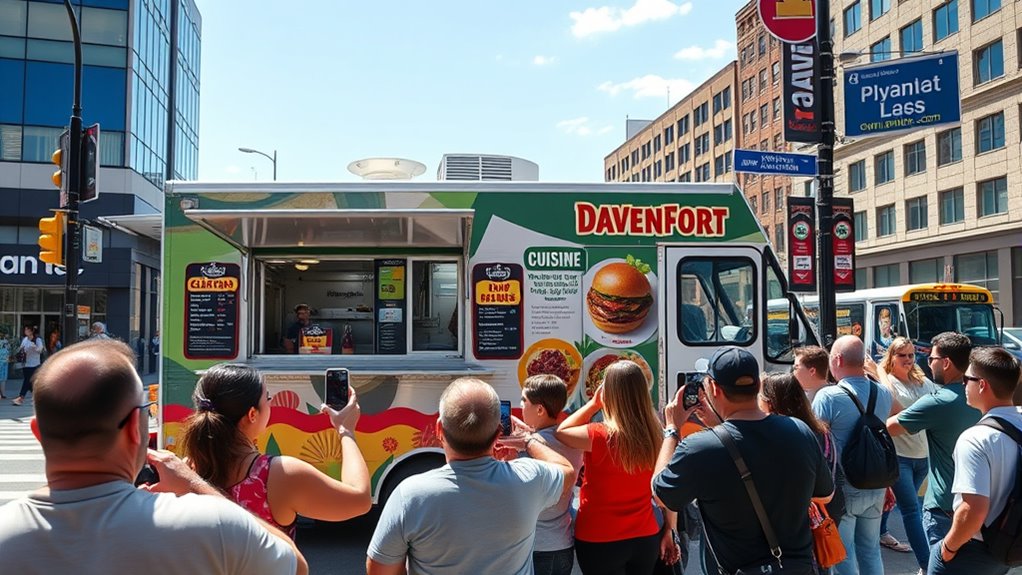
To stand out in Davenport’s crowded food truck scene, you need to adopt smart marketing and customer engagement strategies that connect with your audience. Use social media to reach more customers—75% of trucks rely on Facebook for promotion and community building. Effective campaigns can boost sales by 20%, with active engagement increasing customer spend by 15%. Participating in local events and festivals enhances visibility, while partnerships with nearby businesses drive foot traffic. Data analytics and mobile tools help target customers better, with a 25% higher ROI and increased app downloads. Understanding your audience—mainly Millennials and Gen Z—guides menu choices and branding. Here’s a quick overview:
| Strategy | Benefit |
|---|---|
| Social media marketing | Boosts sales and online visibility |
| Event participation | Builds local awareness and loyalty |
| Data analytics & mobile tools | Improves customer targeting and retention |
| Community partnerships | Increases foot traffic and brand trust |
| Audience-focused menu design | Attracts younger, health-conscious customers |
Additionally, leveraging knowledge about Gold IRA Rollovers can help diversify your investment portfolio for long-term financial security.
Essential Operational Considerations for Success
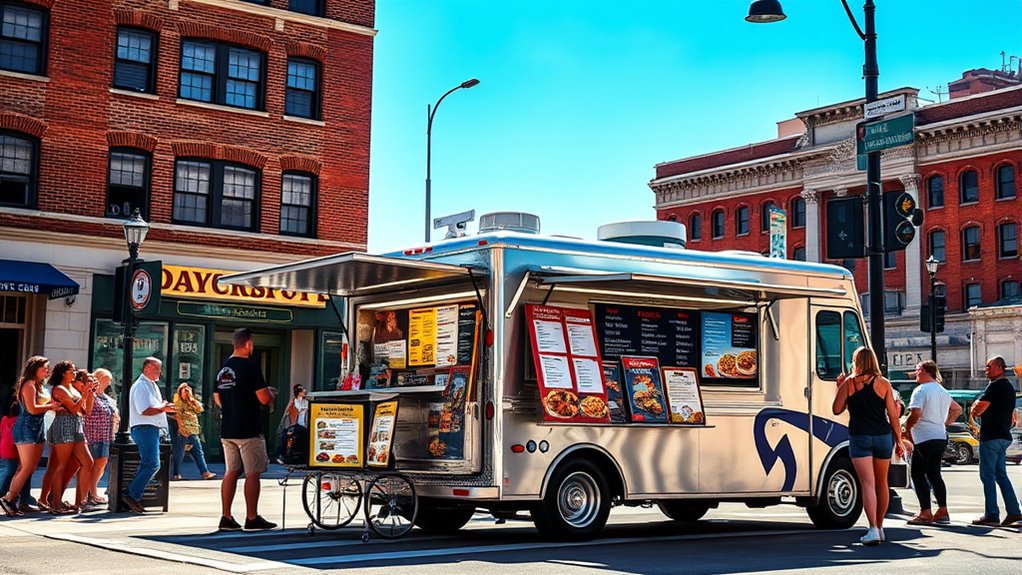
Successfully operating a food truck in Davenport requires careful attention to licensing, regulations, and compliance measures. First, you must obtain a “mobile vendor” license from the Scott County Health Department, costing $27 annually. Second, secure a Davenport business license, like a $55 mobile food unit license for private property vending, plus permits for street vending starting at $100 with City Council approval. Third, meet health and safety standards by passing inspections, obtaining food safety certification, and maintaining sanitation and equipment standards. Fourth, coordinate with city departments like zoning, police, and fire to ensure compliance with fire codes and parking regulations. Staying current with licensing renewals and understanding operational restrictions is vital to avoid fines and guarantee smooth daily operations.
Frequently Asked Questions
How Long Does the Permit Approval Process Typically Take in Davenport?
The permit approval process in Davenport usually takes at least 30 days, but it can take longer if your application is incomplete or involves multiple departments. You should submit your application well in advance, ideally 30 days before your planned operation. Factors like coordination among city agencies, the type of permit, and whether you’re vending on private property can influence the timeline, so plan accordingly to avoid delays.
Are There Restrictions on Operating Hours for Food Trucks in Davenport?
You might wonder about operating hours restrictions for food trucks in Davenport. While the city doesn’t set specific hours, you need to follow local regulations that prevent obstructing pedestrian traffic and comply with your permits. Operating on private property usually offers more flexibility, but street vending requires special permits and approved time slots. Always adhere to safety and noise ordinances and display your licenses clearly to avoid penalties.
Can I Sell Alcohol or Beverages From My Food Truck in Davenport?
Imagine a key to a locked door—selling alcohol from your food truck in Davenport isn’t simply about opening it. You need a specific liquor license or a temporary permit, especially if you’re serving beer or wine. Non-alcoholic drinks are easier, requiring only basic food safety licenses. Always make sure your licenses are visible and comply with state and city regulations, or you risk penalties or losing your license to serve.
What Are the Specific Fire Safety Requirements for Mobile Food Units?
You need to meet specific fire safety requirements for your mobile food unit. Make sure your unit has a fire suppression system and NFPA-compliant portable extinguishers accessible at all times. Fuel tanks should only be filled outside operating hours, and electrical systems must follow NFPA 70 standards. Guarantee proper ventilation, fire safety devices, emergency shutoffs, and operator training to minimize fire risks and pass inspections smoothly.
Is There a Designated Storage Area for Food Trucks in Davenport?
Like a compass guiding your way, your storage options in Davenport are clear. There’s no specific public or private storage lot designated for food trucks. Instead, you’ll need to use a licensed commissary, private property, or licensed food establishment for overnight storage. These facilities must meet health and safety standards, and you’ll need proper permits. Planning ahead guarantees you stay compliant and avoid any storage hiccups on your food truck journey.
Conclusion
Starting a food truck in Davenport might seem overwhelming, but with the right permits, location choices, and marketing strategies, you can thrive. Don’t worry about the costs or regulations—plan ahead and stay compliant. If you think it’s too complicated, remember many successful vendors began just like you, taking small steps to build their brand. With passion and persistence, you’ll turn your food truck dream into a delicious reality.
